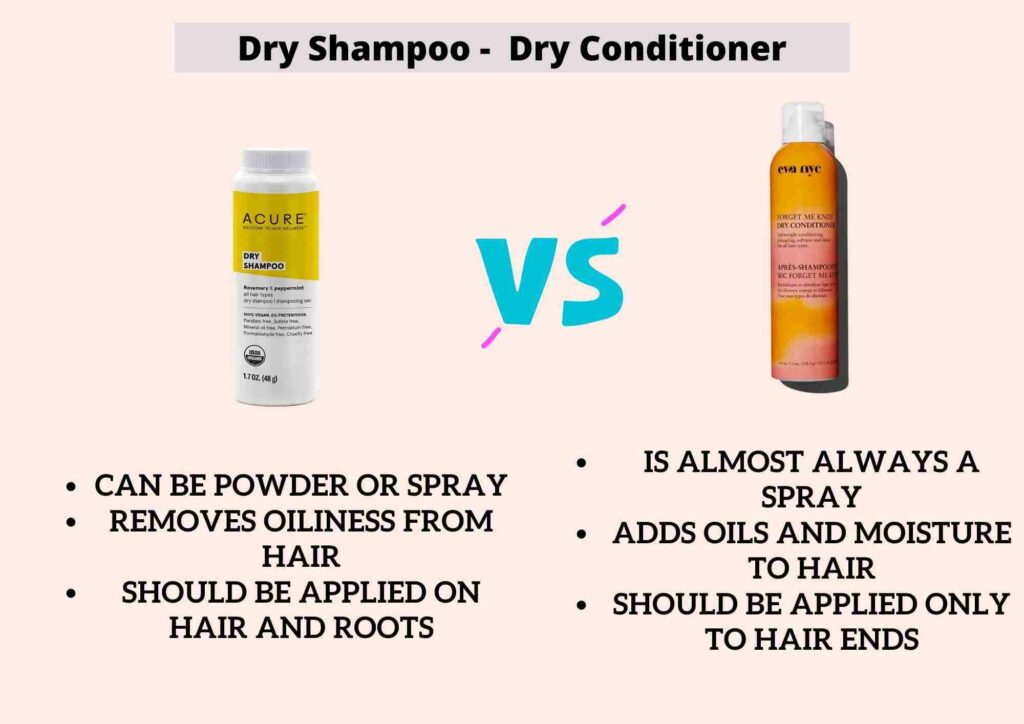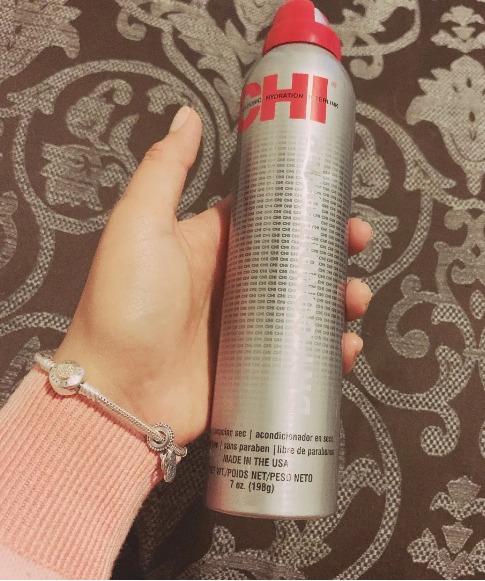Dry shampoo vs Dry conditioner vs leave-in conditioner! Check out the best dry conditioners, how to use them and difference between dry shampoo.
Discover the distinct roles of dry shampoo and dry conditioner in our concise guide, and learn how to best incorporate these convenient hair care staples into your beauty routine for refreshed, well-maintained locks on the go.
What is the difference between dry shampoo and dry conditioner?
A dry conditioner is an aerosol product that usually contains ingredients like silicones or oils that help add moisture to hair and reduce frizz. Unlike leave-in conditioners these products are not liquid and dry immediately on contact. So they don’t leave hair limp or wet and can be used right after styling them.
Key Takeaways:
- Dry shampoo absorbs oiliness from hair and scalp, extending time between traditional washes.
- However, Dry conditioner adds moisture, reduces frizz, and softens hair without leaving it greasy.
- Benefits of dry conditioner include reducing frizz instantly, softening dry hair, and maintaining blowouts.
- Overuse of dry conditioner can lead to product buildup and potential hair issues.
- Proper application involves spraying from a distance and focusing on roots for dry shampoo and ends for dry conditioner.
- Dry shampoo and dry conditioner can be used alone or together for optimal results.
- Regular washing with shampoo and conditioner remains essential for hair health.
Dry Shampoo Vs Dry Conditioner
| Dry Shampoo | Dry Conditioner |
| Helps reduce oiliness on hair | Adds moisture to hair |
| Usually contains starch or rice powder that help absorb oiliness | Contains silicones or oils that help nourish hair |
| Adds volume to hair | Reduces frizz and softens hair |
| Might be powder or aerosol spray | Usually an aerosol spray |
| Can cause hair to look too dry if used excessively | Can make hair limp if used excessively |
| Some dry shampoos tend to leave white residue on hair | Does not leave residue but can cause product buildup if silicone-based |

Benefits Of Using Dry Conditioner
Reduces Frizzy Hair Instantly
Frizzy hair is caused by a lack of moisture in your strands. So using a dry conditioner is a great way to instantly reduce frizzy hair. The one advantage dry conditioner has over leave-in conditioner is that it’s not liquid and gives a dry finish. So you get rid of frizz without ruining your hairstyle.
Softens Dry Hair
If your hair is feeling very dry, then this conditioner is a great way to nourish it. Applying oils or serums can leave hair with a wet look and even make hair oily. But that’s not the case with dry conditioners.
Helps Keep Your Blowout Looking Fresh
I’ve always noticed that my Brazilian Blowout doesn’t look as good on day two or day three. But using a dry conditioner helps your hair stay smoother for longer as it controls frizz and dryness. So it’s a fantastic way of making sure your salon-styled hair stays looking good in the coming days too.
Saves Time When Used With Dry Shampoo
Listen, sometimes you just don’t have time to freshly shampoo, condition and then dry hair. But if you still want hair that looks freshly washed and conditioned then using a dry shampoo followed by a dry conditioner is the best way to achieve this.
Side Effects of Dry Conditioner
Dry conditioner like every other hair product isn’t bad for your hair if you’re using it judiciously.
Excessive use of dry conditioners can cause product buildup on hair as the main ingredient in most of these products is silicone.
Now while silicone is excellent at controlling frizz by smoothening hair, it also coats hair strands completely. So unless you’re using a clarifying shampoo to remove this buildup any sort of hair treatments or oils cannot penetrate hair easily.
For this reason most hair experts believe products containing silicones are bad for hair and don't recommend them.
Also, dry conditioners cannot be substituted for regular shampoo and conditioner. Washing hair is important to remove dirt, grime and bacteria.
Your cuticles are also open after a shower thanks to the vigorous washing motions and warm water, so a regular conditioner will penetrate strands better.

How To Use Dry Shampoo And Dry Conditioner ?
You can use a dry conditioner alone or right after using a dry shampoo. Here’s how you use both these products.
Firstly, shake the bottle of dry shampoo thoroughly as they are usually aerosol cans and you’ll need to make sure you don’t just get the gas.
Next, keep the bottle of dry shampoo at least 8-10 inches away from your hair, spray the shampoo on the roots and massage the product in.
Gently rub the dry shampoo onto your scalp with your fingertips till no trace remains.
Now onto the dry conditioner!
Unlike dry shampoos, you don’t have to spray conditioner on your roots. In fact, I recommend you not doing it so as to avoid product buildup.
Similar to the way you spray dry shampoo, apply dry conditioner to the ends of your hair.
When To Use Dry Shampoo And Dry Conditioner?
Are you tired of traditional hair washing routines and looking for alternatives? The hair care industry has come up with two great options for you - Dry Shampoo and Dry Conditioner. But, you may be wondering when to use these products for the best results.
Dry shampoo is a savior for those who have a hectic schedule and do not have enough time for regular hair washes. It absorbs excess oil from your hair and scalp, leaving your hair feeling fresh and clean for an extra day or two.
So, if you are skipping a hair wash or need to refresh your hair after a sweaty workout, dry shampoo can be your go-to solution. However, using it excessively can lead to product buildup and cause damage to your hair.
On the other hand, dry conditioner is a less popular but equally beneficial option. It is used to moisturize and soften dry and frizzy hair, leaving it shiny and smooth.
It comes in handy when your hair is lacking moisture and needs a quick fix. It also helps detangle your hair and eliminate static, making it easier to style.
But, overuse of this product can make your hair appear greasy. In conclusion, dry shampoo and conditioner are both excellent options depending on your specific hair needs.
Use dry shampoo when you need a quick fix and to avoid frequent hair washes while dry conditioner is perfect when your hair is dry, frizzy, or lacking moisture. Remember, everything is best in moderation, and it is important to not overuse these products.
Dry Shampoo Vs Dry Conditioner: FAQs
Have any more doubts about using dry conditioner for your hair, well I’ve answered a few frequently asked questions about this topic below. Check it out!
Can you use a dry conditioner every day?
What is the best dry conditioner for curly hair?
When should you use a dry conditioner?
Does Dry Conditioner Help With Greasy Hair?
Unlike traditional conditioners, dry conditioner imparts hydration without leaving a greasy residue, making it a valuable tool for managing and revitalizing oily hair.
It can help to nourish and detangle your locks, while also preventing them from feeling dry and damaged.
Can You Use Dry Shampoo and Dry Conditioner At The Same Time?
If your hair is feeling really dry and frizzy but you’re worried about using a leave-in conditioner for fear of making it greasy then dry shampoo is your best bet.
The main difference between a dry shampoo and conditioner is that while a dry shampoo helps absorb grease and oil from hair to increase volume, a dry conditioner adds moisture in the form of oils to control frizz and leave hair soft.
A lot of stylists prefer using a dry conditioner after styling hair in a particular way as unlike serums or leave-in conditioners they do not wet hair or disturb it.
Also Read:

